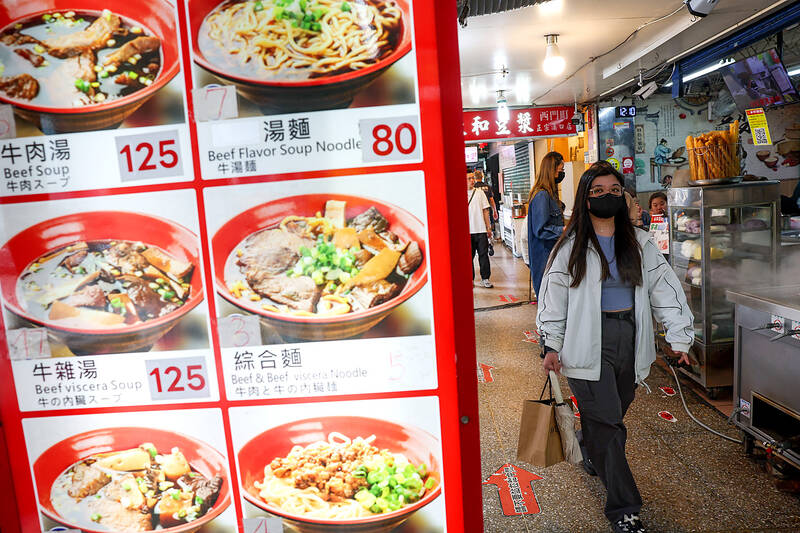Sales in the retail sector last month declined more than expected, government data showed yesterday, driven primarily by a slowdown in vehicle sales, as consumers stayed on the sidelines while awaiting the outcome of Taiwan’s tariff negotiations with the US.
The government is engaged in tariff negotiations with the US after Washington announced a 90-day pause on “reciprocal” tariffs in early April. Market observers are also keeping a close eye on how authorities address US concerns and whether there will be reductions in vehicle import duties and commodity taxes down the line.
Last month, retail sales fell 1.6 percent year-on-year to NT$394.9 billion (US$11.85 billion), the second consecutive monthly decline, data released by the Ministry of Economic Affairs showed.

Photo: CNA
That was the second-largest decline of the year and worse than the ministry’s forecast, which projected a range from a 1 percent drop to a 2 percent increase, with sales expected to be between NT$397.3 billion and NT$409.4 billion.
Sales of cars, motorcycles, auto parts and accessories saw a significant 18 percent year-on-year decrease, the largest drop since July 2021, attributed to rising economic uncertainty affecting consumer confidence, as well as some car models entering the transition period, the ministry said.
Excluding sales of vehicles and auto parts, retail sales last month were still 2.8 percent higher than a year earlier, the ministry said in a report.
Declines in spending were also seen at fuel retail outlets and home appliance stores, down 8.4 percent and 2.8 percent year-on-year respectively, the report said.
Driven by Dragon Boat Festival promotions, new store openings and aggressive marketing campaigns by vendors, sales at e-commerce sites, apparel shops, cosmetics outlets, supermarkets, convenience stores, hypermarkets, department stores, and computer and electronics stores continued to rise, the report said.
In the first five months of this year, retail sales increased 0.1 percent year-on-year to NT$1.97 trillion, a record for the same period, ministry data showed.
Meanwhile, sales in the food and beverage sector saw a 6.5 percent year-on-year rise last month, reaching NT$90.2 billion. This was the third consecutive month of growth and the highest sales level for May in history, exceeding the ministry’s forecast of an annual increase of 1.8 to 4.8 percent, which ranged from NT$86.2 billion to NT$88.8 billion.
The ministry attributed this growth to events surrounding Mother’s Day and the Dragon Boat Festival, as well as joint promotions by vendors that benefited restaurants and beverage stores, while strong demand for in-flight meals contributed to the sales increase for catering service providers, the report said.
In the first five months of the year, food and beverage sales rose 4 percent year-on-year to NT$445.9 billion, another record high for the same period, it said.
For this month, the ministry said that retail sales would reach between NT$387.6 billion and NT$399.7 billion, representing an annual decline of 0.4 to 3.4 percent, while food and beverage sales are projected to increase 1.2 to 4.2 percent to between NT$88 billion and NT$90.7 billion.

SMART MANUFACTURING: The company aims to have its production close to the market end, but attracting investment is still a challenge, the firm’s president said Delta Electronics Inc (台達電) yesterday said its long-term global production plan would stay unchanged amid geopolitical and tariff policy uncertainties, citing its diversified global deployment. With operations in Taiwan, Thailand, China, India, Europe and the US, Delta follows a “produce at the market end” strategy and bases its production on customer demand, with major site plans unchanged, Delta president Simon Chang (張訓海) said on the sidelines of a company event yesterday. Thailand would remain Delta’s second headquarters, as stated in its first-quarter earnings conference, with its plant there adopting a full smart manufacturing system, Chang said. Thailand is the firm’s second-largest overseas

‘REMARKABLE SHOWING’: The economy likely grew 5 percent in the first half of the year, although it would likely taper off significantly, TIER economist Gordon Sun said The Taiwan Institute of Economic Research (TIER) yesterday raised Taiwan’s GDP growth forecast for this year to 3.02 percent, citing robust export-driven expansion in the first half that is likely to give way to a notable slowdown later in the year as the front-loading of global shipments fades. The revised projection marks an upward adjustment of 0.11 percentage points from April’s estimate, driven by a surge in exports and corporate inventory buildup ahead of possible US tariff hikes, TIER economist Gordon Sun (孫明德) told a news conference in Taipei. Taiwan’s economy likely grew more than 5 percent in the first six months

SUPPLY RESILIENCE: The extra expense would be worth it, as the US firm is diversifying chip sourcing to avert disruptions similar to the one during the pandemic, the CEO said Advanced Micro Devices Inc (AMD) chief executive officer Lisa Su (蘇姿丰) on Wednesday said that the chips her company gets from supplier Taiwan Semiconductor Manufacturing Co (TSMC, 台積電) would cost more when they are produced in TSMC’s Arizona facilities. Compared with similar parts from factories in Taiwan, the US chips would be “more than 5 percent, but less than 20 percent” in terms of higher costs, she said at an artificial intelligence (AI) event in Washington. AMD expects its first chips from TSMC’s Arizona facilities by the end of the year, Su said. The extra expense is worth it, because the company is

The seizure of one of the largest known mercury shipments in history, moving from mines in Mexico to illegal Amazon gold mining zones, exposes the wide use of the toxic metal in the rainforest, according to authorities. Peru’s customs agency, SUNAT, found 4 tonnes of illegal mercury in Lima’s port district of Callao, according to a report by the non-profit Environmental Investigations Agency (EIA). “This SUNAT intervention has prevented this chemical from having a serious impact on people’s health and the environment, as can be seen in several areas of the country devastated by the illegal use of mercury and illicit activities,”